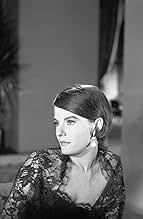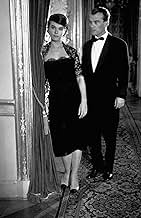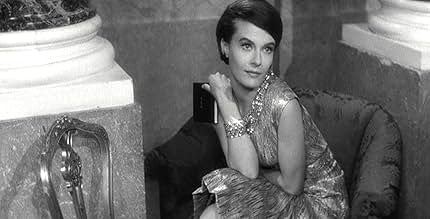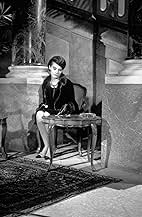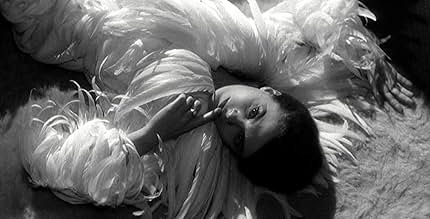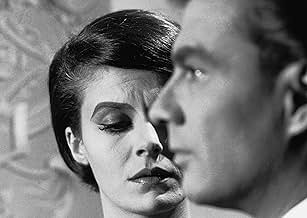CALIFICACIÓN DE IMDb
7.6/10
26 k
TU CALIFICACIÓN
En un extraño y aislado palacete, un hombre conoce a una mujer e intenta convencerla de que se ya se habían conocido antes.En un extraño y aislado palacete, un hombre conoce a una mujer e intenta convencerla de que se ya se habían conocido antes.En un extraño y aislado palacete, un hombre conoce a una mujer e intenta convencerla de que se ya se habían conocido antes.
- Nominado a 1 premio Óscar
- 2 premios ganados y 5 nominaciones en total
Karin Toeche-Mittler
- Un personnage de l'hôtel
- (as Karin Toche-Mittler)
Davide Montemurri
- Un personnage de l'hôtel
- (as Davide Montemuri)
Alan Edwards
- English Introduction
- (sin créditos)
- Dirección
- Guionista
- Todo el elenco y el equipo
- Producción, taquilla y más en IMDbPro
Argumento
¿Sabías que…?
- TriviaThe match game in the movie is named as "Nim". In order to win the game there is only one tactic including a system called "Nim Sum". If both players use this tactic perfectly, then the owner of the first move will eventually lose. Due to the same reason, it is always disadvantageous to start the game first.
- ErroresExterior night scenes were shot day-for-night, but the sky and reflections of it were allowed in the frame, and they appear as bright white instead of black. This may have been intentional to emphasize the surreality of the film.
- Citas
[X wanders through the hotel's corridors cataloging items he sees]
X: Empty salons. Corridors. Salons. Doors. Doors. Salons. Empty chairs, deep armchairs, thick carpets. Heavy hangings. Stairs, steps. Steps, one after the other. Glass objects, objects still intact, empty glasses. A glass that falls, three, two, one, zero. Glass partition, letters.
- ConexionesFeatured in Fejezetek a film történetéböl: A francia új hullám (1990)
Opinión destacada
"Last Year at Marienbad" (1961) Dir.: Alain Resnais
When it comes to cinema, I'm neither a philistine nor a scholar. I'm happy to read into a film's artistic context in preparation for watching it, but it must be self-evident, and not reliant upon anything but its own merit and communicability to be considered a success. In practice, this means I will certainly read the hype, but I won't necessarily believe it. And it's a good job, because "Last Year at Marienbad" remains one of the most hyped, discussed and debated movies of all time. People disagree over virtually everything about it - the pace, the narrative structure, the individual performances, the pretense, even the plot points. Yes, that's right, after forty-eight years people still argue over what actually happens in this film, let alone what it all means and how successfully it is presented to us. So I decided to ignore the minefields of audience opinion (which is largely positive anyway, if wildly diverse) and dive in without fuss, volunteering to watch this movie from the 'philistine' end of the spectrum and if I didn't like it, screw it. It's only one film anyway.
When it became clear what I was watching, and how many traditional storytelling criteria were obviously not going to be fulfilled by "...Marienbad", I felt like I had burst in to the film's aristocratic country retreat wearing torn jeans and waving a bottle of tequila around, but ended up having an awesome time in a completely unexpected way. Make no mistake, I thoroughly enjoyed this movie. It is a near-perfect realisation of a very, very dense and ambitious concept, and Resnais should be proud that he and his film-making team were able to make it. It is stately, baffling, elegant, sinister and brilliant.
Not that I could tell you what it's actually about, of course. Most people seem to think it's about the tricks and subjective nature of the memory, and the inherent flaws in how we cross-reference events with other events over time. These broad, elemental themes are the only ones I feel sure enough about to include in this review, which is illustrative of "Last Year at Marienbad"s disorienting effect. We are taken on an endless stroll through the rooms and corridors of a cold, strange country manor where the upper classes take their holidays and engage in card games and theatre. Their discussions are empty and meaningless, yet they go on forever. Time is not present in a recognisable form as the unnamed narrator loses track of how long he has been there, and how long he has attempted to persuade the unnamed woman that they met before, and that she had promised to run away with him. "Wait for one year," she'd supposedly said. "Next year I will leave with you." But the woman has no memory of him or her promise. She appears to be married to another man, who is tall, dour and imposing. Despite this, she keeps the unnamed narrator at arm's length, drawing him in and then pushing him back as if she does indeed remember something of him but is unwilling to accept it. His struggle to awaken some kind of acknowledgement of their shared past is the premise of the film.
"Last Year at Marienbad" is a bizarre maze of half-recollections and inaccuracies, where words and events are repeated several times in different situations and everything we see is very possibly on an endless loop, eventually folding in on itself and collapsing into a kind of incomprehensible singularity. We have no frames of reference for what we are seeing other than what has already been seen, and we are never to know what's 'now' and what's a memory because the characters cross over between the two. As a result I found myself trying to draw a line between reality and false memory up to about half way through the film, after which I abandoned it as a futile exercise. This is one of its key strengths - it demands so much of the viewer that we are forced to build a structure for it in our own heads, and our efforts are routinely dashed.
This all sounds terribly oblique and ridiculous, and in a sense it is; its detractors have regularly labelled it as such and that's a valid conclusion to reach. But it is spectacular on the eye, and this carried my attention right through the difficulties and to the end of the movie without so much as a pause. The camera sweeps down hallways and bursts out across garden terraces without even a jolt, it literally dances its way through the film as if it were another character. There are odd touches, too, that contribute to the striking atmosphere of the film, like Resnais' decision to have his supporting actors and extras remain completely static until they are speaking or in the company of the main three characters. He also skillfully breaks the pace by accelerating towards several shuddering climaxes in the last half of the film, which renew the viewer's attention and string us further along towards an ending that we hope will allow us something more definite to grasp.
Whether it does or not, I will withhold. It's one of the many reasons to watch this film. But beware, it is genuinely challenging viewing – and in fact, its esotericism is the only reason I won't rate this higher than I have.
When it comes to cinema, I'm neither a philistine nor a scholar. I'm happy to read into a film's artistic context in preparation for watching it, but it must be self-evident, and not reliant upon anything but its own merit and communicability to be considered a success. In practice, this means I will certainly read the hype, but I won't necessarily believe it. And it's a good job, because "Last Year at Marienbad" remains one of the most hyped, discussed and debated movies of all time. People disagree over virtually everything about it - the pace, the narrative structure, the individual performances, the pretense, even the plot points. Yes, that's right, after forty-eight years people still argue over what actually happens in this film, let alone what it all means and how successfully it is presented to us. So I decided to ignore the minefields of audience opinion (which is largely positive anyway, if wildly diverse) and dive in without fuss, volunteering to watch this movie from the 'philistine' end of the spectrum and if I didn't like it, screw it. It's only one film anyway.
When it became clear what I was watching, and how many traditional storytelling criteria were obviously not going to be fulfilled by "...Marienbad", I felt like I had burst in to the film's aristocratic country retreat wearing torn jeans and waving a bottle of tequila around, but ended up having an awesome time in a completely unexpected way. Make no mistake, I thoroughly enjoyed this movie. It is a near-perfect realisation of a very, very dense and ambitious concept, and Resnais should be proud that he and his film-making team were able to make it. It is stately, baffling, elegant, sinister and brilliant.
Not that I could tell you what it's actually about, of course. Most people seem to think it's about the tricks and subjective nature of the memory, and the inherent flaws in how we cross-reference events with other events over time. These broad, elemental themes are the only ones I feel sure enough about to include in this review, which is illustrative of "Last Year at Marienbad"s disorienting effect. We are taken on an endless stroll through the rooms and corridors of a cold, strange country manor where the upper classes take their holidays and engage in card games and theatre. Their discussions are empty and meaningless, yet they go on forever. Time is not present in a recognisable form as the unnamed narrator loses track of how long he has been there, and how long he has attempted to persuade the unnamed woman that they met before, and that she had promised to run away with him. "Wait for one year," she'd supposedly said. "Next year I will leave with you." But the woman has no memory of him or her promise. She appears to be married to another man, who is tall, dour and imposing. Despite this, she keeps the unnamed narrator at arm's length, drawing him in and then pushing him back as if she does indeed remember something of him but is unwilling to accept it. His struggle to awaken some kind of acknowledgement of their shared past is the premise of the film.
"Last Year at Marienbad" is a bizarre maze of half-recollections and inaccuracies, where words and events are repeated several times in different situations and everything we see is very possibly on an endless loop, eventually folding in on itself and collapsing into a kind of incomprehensible singularity. We have no frames of reference for what we are seeing other than what has already been seen, and we are never to know what's 'now' and what's a memory because the characters cross over between the two. As a result I found myself trying to draw a line between reality and false memory up to about half way through the film, after which I abandoned it as a futile exercise. This is one of its key strengths - it demands so much of the viewer that we are forced to build a structure for it in our own heads, and our efforts are routinely dashed.
This all sounds terribly oblique and ridiculous, and in a sense it is; its detractors have regularly labelled it as such and that's a valid conclusion to reach. But it is spectacular on the eye, and this carried my attention right through the difficulties and to the end of the movie without so much as a pause. The camera sweeps down hallways and bursts out across garden terraces without even a jolt, it literally dances its way through the film as if it were another character. There are odd touches, too, that contribute to the striking atmosphere of the film, like Resnais' decision to have his supporting actors and extras remain completely static until they are speaking or in the company of the main three characters. He also skillfully breaks the pace by accelerating towards several shuddering climaxes in the last half of the film, which renew the viewer's attention and string us further along towards an ending that we hope will allow us something more definite to grasp.
Whether it does or not, I will withhold. It's one of the many reasons to watch this film. But beware, it is genuinely challenging viewing – and in fact, its esotericism is the only reason I won't rate this higher than I have.
- youllneverbe
- 14 abr 2009
- Enlace permanente
Selecciones populares
Inicia sesión para calificar y agrega a la lista de videos para obtener recomendaciones personalizadas
- How long is Last Year at Marienbad?Con tecnología de Alexa
Detalles
- Fecha de lanzamiento
- Países de origen
- Sitio oficial
- Idioma
- También se conoce como
- Last Year at Marienbad
- Locaciones de filmación
- Productoras
- Ver más créditos de la compañía en IMDbPro
Taquilla
- Total en EE. UU. y Canadá
- USD 207,917
- Fin de semana de estreno en EE. UU. y Canadá
- USD 15,485
- 20 ene 2008
- Total a nivel mundial
- USD 223,111
- Tiempo de ejecución1 hora 34 minutos
- Color
- Mezcla de sonido
- Relación de aspecto
- 2.35 : 1
Contribuir a esta página
Sugiere una edición o agrega el contenido que falta

Principales brechas de datos
What is the Canadian French language plot outline for El año pasado en Marienbad (1961)?
Responda


